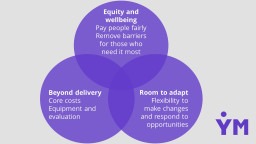Finance and fundraising hub
We know that being financially resilient and sustainable is particularly tough for grassroots organisations. We’ve created this hub to support you with this. It contains information about our flexible funding policy for applicants and funded partners, and resources to support you with finance and fundraising.
We know the imporance of core funding. In our Trailblazer Fund and Catalyser Fund, a proportion of the budget must always be spent on delivery costs. Beyond this, there are no rules on the amount or percentage of core funding people can request. Information about eligible costs, eligible activities, and match funding thresholds about each fund can be found in the respective fund guidance:
Youth Music’s flexible funding policy
Our approach to flexible funding supports applicants and funded partners to budget in a fair and sustainable way.
The image below summarises the three budgeting principles that make up our approach to flexible funding:
- Equity and wellbeing
- Beyond delivery
- Room to adapt

Click on the tiles below to find out more about what our flexible funding policy means for applicants and funded partners. You can also download a PDF copy of this information.
Finance and fundraising resources
We’ve compiled guidance, videos, templates and other resources to support with your finance and fundraising practices and strategies.
Click on the tiles to access the resources. You can also download a PDF copy of the resources.
